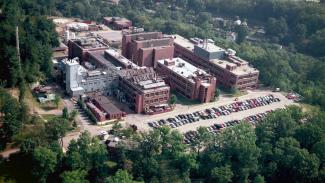NETL together with the Quantum Science Center at Oak Ridge National Laboratory (ORNL) and Pittsburgh Quantum Institute (PQI) to hold a joint workshop on April 16th as part of the PQI2021 Virtual Workshop on quantum information science, held April 13-16.
As a free workshop, PQI2021 gave attendees the opportunity to explore panel discussions on quantum science applications in communications, defense and other topics, along with a series of speakers from national and international universities.
The field of quantum mechanics has laid the foundation for science and engineering in the 20th century, forming the roots of semiconductors, superconductors, magnetic materials and the periodic table. The increasingly sophisticated ability to understand the quantum nature of matter led to the development of many inventions such as transistors, lasers and MRI scanners, which have profoundly transformed society technologically.
“Quantum mechanics is an exciting topic, especially when considering what can be achieved when quantum computers, which can perform calculations impossible for ordinary computers, go mainstream,” said Madhava Syamlal, senior fellow at NETL. “By sponsoring the PQI workshop, the Lab had a chance to learn about the technical aspects and assess what quantum sciences hold for energy-related applications.”
Quantum information science (QIS) is a newly emerging area of research for NETL and is expected to profoundly change the practice of science and engineering in the coming decades. QIS technology exploits quantum phenomena for performing tasks that are impossible to do today, such as finding prime factors of large numbers or elucidating reaction mechanisms in complex chemical systems.
A rapidly progressing field, QIS is fueled by large investments from the private sector and governments. Its importance to the U.S. economy and national security is underscored by the National Quantum Initiative Act passed in December 2018, which creates a coordinated multiagency program to support research and training in QIS.
NETL launched an initiative called Quantum For Energy Systems and Technologies (QUEST) for applying QIS to problems encountered in energy technology development. Potential areas of application include subsurface engineering; sensors and detectors; power plant, electrical grid and oil and gas pipeline cybersecurity; materials development; power plant design and optimization; and power plant operation and control. Activities to date include the following:
QUEST Technical Working Group – This effort established a workforce capable of developing, reviewing, managing and advising on QIS-related technologies for NETL and the U.S. Department of Energy’s Office of Fossil Energy (FE). Group members, along with their supervisors, are developing a training strategy to establish enough competency for proposing, executing and managing research projects within a one- to three-year timeline.
Quantum Sensing – The activity launched a seed project to pursue selected near-term research and development (R&D) opportunities for quantum sensing to impact the fossil energy mission. Specific initiatives include:
- Integrate quantum sensing materials for chemical sensing in subsurface monitoring (for example, pH and carbon dioxide), natural gas infrastructure monitoring (pipelines or methane) and rare earth element detection. Emphasis was placed on low-cost quantum sensing materials that can be produced from coal byproducts.
- Leverage quantum squeezed and entangled photons for optimizing performance of distributed interrogation methodologies for the optical fiber sensor platform.
Quantum Computing – A study group at NETL is developing proficiency in quantum computing for energy related applications.
The Pittsburgh Quantum Institute (PQI) was founded in 2012 with the mission to help unify and promote quantum science and engineering in Pittsburgh. With financial support from the Dietrich School of Arts and Sciences at the University of Pittsburgh, PQI provides leadership throughout Pittsburgh in areas that impact the “second quantum revolution.”
The Quantum Science Center (QSC) located at ORNL is one of five national QIS research centers established by the U.S. Department of Energy’s Office of Science. It is dedicated to overcoming key roadblocks in quantum state resilience, controllability, and ultimately the scalability of quantum technologies to realize the quantum future.
The U.S. Department of Energy’s National Energy Technology Laboratory develops and commercializes advanced technologies that provide clean energy while safeguarding the environment. NETL’s work supports DOE’s mission to ensure America’s security and prosperity by addressing its energy and environmental challenges through transformative science and technology solutions.




